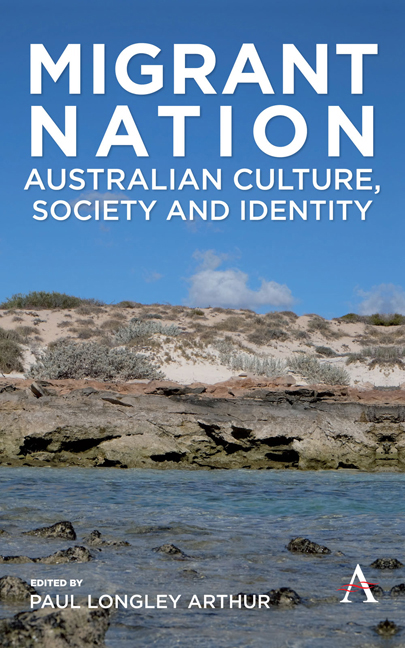Book contents
- Frontmatter
- Contents
- List of Figures
- 1 Introduction: Transcultural Studies in Australian Identity
- 2 Remembering Aboriginal Sydney
- 3 Files and Aboriginal Lives: Biographies from an Archive
- 4 Writing, Femininity and Colonialism: Judith Wright, Hélène Cixous and Marie Cardinal
- 5 The Staging of Social Policy: The Photographing of Post-War British Child Migrants
- 6 Writing Home from China: Charles Allen's Transnational Childhood
- 7 Australian? Autobiography? Citizenship, Postnational Self-Identity and the Politics of Belonging
- 8 A Nikkei Australian Story: Legacy of the Pacific War
- 9 Displaced Persons (1947–52) in Australia: Memory in Autobiography
- 10 Between Utopia and Autobiography: Migrant Narratives in Australia
- 11 Vietnamese–Australian Life Writing and Integration: The Magazine for Multicultural and Vietnamese Issues
- 12 Heroes, Legends and Divas: Framing Famous Lives in Australia
- List of Contributors
- Index
10 - Between Utopia and Autobiography: Migrant Narratives in Australia
Published online by Cambridge University Press: 10 May 2018
- Frontmatter
- Contents
- List of Figures
- 1 Introduction: Transcultural Studies in Australian Identity
- 2 Remembering Aboriginal Sydney
- 3 Files and Aboriginal Lives: Biographies from an Archive
- 4 Writing, Femininity and Colonialism: Judith Wright, Hélène Cixous and Marie Cardinal
- 5 The Staging of Social Policy: The Photographing of Post-War British Child Migrants
- 6 Writing Home from China: Charles Allen's Transnational Childhood
- 7 Australian? Autobiography? Citizenship, Postnational Self-Identity and the Politics of Belonging
- 8 A Nikkei Australian Story: Legacy of the Pacific War
- 9 Displaced Persons (1947–52) in Australia: Memory in Autobiography
- 10 Between Utopia and Autobiography: Migrant Narratives in Australia
- 11 Vietnamese–Australian Life Writing and Integration: The Magazine for Multicultural and Vietnamese Issues
- 12 Heroes, Legends and Divas: Framing Famous Lives in Australia
- List of Contributors
- Index
Summary
The genres of autobiographical writing and utopian writing have little in common. While an autobiography is an account of the life of an individual written by that individual, utopian narrative offers a vision of an ideal place and social system for a collective. In fact, according to Robert F. Sayre, autobiography and utopia indicate polarities: between experience and prophecy, self and society, private and public or emotional unity and rational order (Sayre 1972, 21, 23). Both forms have firmly marked their presence in the culture and history of Australia. Autobiography, as Joy Hooton writes, has always been a prolific genre in Australia (Hooton 1993, 1), with the country's distance from the ‘old world’ being a major factor in inspiring travellers and immigrants to record their stories. At the same time, utopianism has played a major role in Australian history.
While New Zealand is viewed as ‘unique in the way that utopian projects became part of the normal course of political debate’, and the core of that country's identity as a nation (Sargent 2005, 1), Australia has also been a site for utopian visions. From the fanciful depictions of antipodean creatures that amused eighteenth-century readers, through pastoral ‘myths’, to stories of streets paved with gold, Australia has displayed utopian aspirations as part of its nation-building. In her book To Constitute a Nation, Helen Irving argues that, for Australia to become a nation, its people had to imagine a nation first:
Before a nation can be formed, a group of separate populations must imagine themselves part of a larger national community. Then they must imagine it as natural and inevitable that such a community should exist. (1999, 25; see also Anderson 1983)
Thus, what drives the process of creating the nation, as documented in autobiographical and semiautobiographical writing, can be understood as ‘the attempt to bring the imaginary and the real together’ (Irving 1999, 25).
The aim of this chapter is to examine the relationship between the imaginary and the real in autobiographical and semiautobiographical writing of Polish post– World War II migrants to Australia through their use of utopian ideas and themes. The main argument is that migrant writing, usually autobiographical and hardly ever formally utopian, can connect these concepts of utopia and autobiography in a productive way.
- Type
- Chapter
- Information
- Migrant NationAustralian Culture, Society and Identity, pp. 177 - 200Publisher: Anthem PressPrint publication year: 2017



